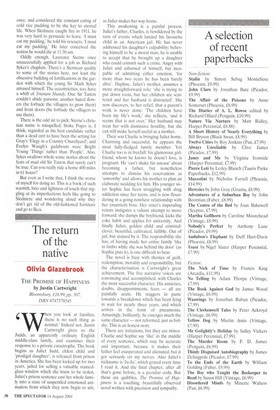The return of the native
Olivia Glazebrook
THE PROMISE OF HAPPINESS by Justin Cartwright Bloomsbury, £16.99, pp. 307, ISBN 0747570345 ‘ henyou look at families, there is no such thing as normal.' Indeed not. Justin Cartwright gives us the Judds, an apparently ordinary English middle-class family, and examines their response to a private catastrophe. The book begins as Juliet Judd, eldest child and 'prodigal daughter', is released from prison in America. She has been locked up for two years, jailed for selling a valuable stainedglass window which she knew to be stolen. Juliet's prison sentence cast her whole family into a state of suspended emotional animation from which they now begin to stir, This awakening is a painful process. Juliet's father, Charles, is bewildered by the turn of events which landed his favourite child in an American jail. He has never addressed his daughter's culpability; believing himself to be a moral man, he is unable to accept that he brought up a daughter who could commit such a crime. Angry with Juliet and ashamed of himself, but incapable of admitting either emotion, 'for more than two years he has been barely alive'. Daphne, Juliet's mother, assumes a more straightforward role: 'she is trying to put down roots, but her children are scattered and her husband is distracted'. She now discovers, to her relief, that a parent's work is never done: 'The children have been my life's work,' she reflects, 'and it seems that is not over.' Her husband may treat her with dismissive hostility, but she can still make herself useful as a mother.
Their son Charlie is bringing Juliet home. Charming and successful, he appears the most fully-fledged family member. Yet Charlie too is in freefall: his glamorous girlfriend, whom he knows he doesn't love, is pregnant. He 'can't shake his unease' about becoming a father, but nonetheless attempts to dismiss his reservations as 'unworthy' and allows his mother to plan an elaborate wedding for him. His younger sister Sophie has been struggling with drug addiction since her teens, and is now floundering in a going-nowhere relationship with her (married) boss. Her sister's impending return instigates a valiant attempt to move forward: she dumps the boyfriend, kicks the coke habit and applies for university. And finally Juliet, golden child and criminal: clever, beautiful, cultivated. fallible. Out of jail, but stained by it. The responsibility she has, of having made her entire family 'like in limbo while she was behind the door' (as Sophie puts it), is one difficult to bear.
The novel is busy with themes of guilt, redemption, morality and responsibility, but the characterisation is Cartwright's great achievement. The five narrative voices are convincing and accomplished, with Charles the most successful character. His anxieties, doubts, disappointments, fears — all are painfully acute. He staggers in panic towards a breakdown which has been lying in wait for nearly three years, and which arrives in the form of pneumonia. Amusingly, brilliantly, he emerges much the same character — not reformed, just as bolshy. This is an honest story.
There are irritations, but they are minor. Charlie and Sophie say 'like' in the middle of every sentence, which may be accurate and important, because it makes their father feel exasperated and alienated, but it got seriously on my nerves. Also Juliet's nickname is lu-Ju', which grated every time I read it. And the final chapter, after all that's gone before, is a peculiar coda. But these are quibbles. The Promise of Happiness is a touching, beautifully observed novel written with precision and sympathy.


























































 Previous page
Previous page